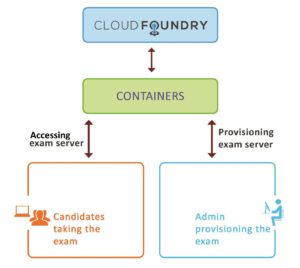The following is a guest post from Rodrigo Flores, Managing Director of the Accenture Cloud Platform in charge of Architecture, Product Management and its Innovation Center. The Accenture Cloud Platform is a hybrid cloud service that delivers a variety of providers such as Amazon, Azure, NTT and others. Additionally, Cloud Management Services, cloud brokering, security and valued added services such PaaS, SaaS and integration.
In the ongoing revolution of everything as a service–software, infrastructure, platform—it’s been the latter that has received the least attention and smallest market-growth forecasts. But today, platform-as-a-service (PaaS) is on the march, the basis of numerous industry partnerships, startup investments, and benefitting from many innovative product and service offerings. In fact, research firm IDC forecasts that the worldwide PaaS market is expected to grow to more than $14 billion in 2017.
The pace of PaaS growth is quickening, primarily because it is becoming a critical platform for developers and administrators to practice DevOps, which is being used to make organizations more agile, faster to market, and customer-responsive.
Several years ago the hope was that PaaS would replace DevOps—totally separating code development from operations. What we have seen since, however, is the two are interlinked at the molecular level; the ops team focuses on providing a stable and reliable environment that in turn allows developers to focus on creating code. Maturing PaaS systems recognize and enhance this marriage by enabling an environment of rapid iteration towards a better product.
DevOps is also accelerating adoption of the next generation of platform-as-a-service, what Accenture calls managed private PaaS. We are hardly alone—a number of service and technology providers are entering this space, driven by clients who want to enhance or even replace their development capabilities with PaaS, or perhaps want to use it as a starting point for a greater journey to cloud in the future.
The attraction of managed private PaaS for small, medium, and even large companies is that they can start faster, and with reduced costs —their partners operate the infrastructure, set up security, install patches, perform backups, and manage many other operations, leaving the company to focus on agile, high-velocity development, test and deployment.
With managed private PaaS, administrators have a dedicated platform to gain a level of control granularity, risk reduction, compliance, policy, support, and best-practice expertise that would be expensive for each enterprise to try to invent on its own. And it can be stood up quickly and paid for by the drink.
For developers, the promise of PaaS is that they can code without worrying about infrastructure. They have instant access to tools they already use and DevOps’ continuous innovation principles—fast fail, rapid cycling, high-velocity agile development–become much more possible when building on the cloud.
Building a private PaaS on your own can be costly–guidance is required around how to stand it up, configure, operate, and make it available to developers. In addition, someone has to worry about what happens at the intersection of platform and infrastructure; this new web-scale application presents unique challenges to infrastructure operators, for which there is little know-how available.
The money and time required to install PaaS using only on-premise resources can ultimately restrain and constrain the PaaS value proposition. A trusted partner is essential if you lack the necessary resources in-house, and, in truth, most internal IT shops do not possess the domain knowledge or resources to do the job well.
The growth of PaaS is recognition that the ever-escalating demands of the marketplace have changed the table stakes for technology providers. Investments that once could be monetized over 20 years must now pay off in two. Product roadmaps are written in weeks and months. Customer loyalty can be counted on only until the next dot-release from the competition. As fast as developers write code, the results are pumped out to provide real value–spinning the demand wheel even faster.
And so the table stakes today are organizational agility and speed to innovation; the new capabilities required by digital business. DevOps serves this need, and managed private PaaS is a key enabler by allowing organizations to adopt DevOps at both a low entry cost and low usage cost—by the drink, scaling to meet real-time business demand.
The future is already here—it’s just not evenly distributed. Those words from William Gibson point to an important truth about cloud. Its tools, services and economics allow smart users to get to the future much more quickly. And managed private PaaS can be an affordable first step in the journey.
© Copyright IDC. Source: IDC, New IDC Worldwide Public Platform as a Service Forecast Shows Market Will Grow to Over $14 Billion in 2017, Doc #prUS24435913, November 2013





